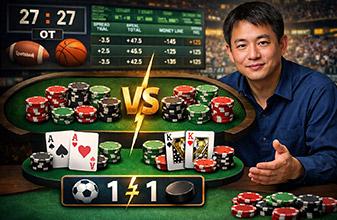Betting in Tournaments with Ten Hands to Go

Casino games tournaments are fun, and they can be profitable too. In upcoming articles, we will continue to publish a series of excerpts from Stanford Wong’s book, Casino Tournament Strategy.
Betting with Ten Hands to Go
This is the time to look around the table and figure out if you are BR*, or what you have to do to become BR*.
BR* means any bankroll that advances to the next round.
These strategies are equally useful if you are playing in a brick-and-mortar casino such as in Las Vegas, or playing in an online tournament.
If You Are BR*
If you are BR* with ten hands or ten minutes (depending on the rules of the tournament) to go, bet with the flow. Whatever the people who are trying to catch you are betting, you should approximately match.
If you are BR* and bet first, make it difficult for your opponents to bet contrary to you. Bet an amount just slightly smaller than your lead. If the maximum bet is small in relation to your bankroll and you bet first, bet half the maximum.
If You Are Not BR*
If you are not BR* with ten hands or ten minutes to go, bet in a manner that gives you a chance to become BR*. If a progression is possible, use it. This is one of very few times in casino games that using a progression makes sense. Progressions are usually worthless.
If you are further behind than the maximum bet, bet either the minimum or the maximum, whichever is contrary to BR*. If you have to bet first and thus do not know whether the minimum or the maximum will be contrary to BR*, bet the maximum. If in doubt about whether to bet the minimum or the maximum, bet the max.
Suppose the person you are trying to catch has bet the max. You have a choice between betting the max and hoping to win while your opponent loses, or betting small and hoping your opponent loses. The latter happens 48% of the time, while the former happens only 12% of the time. This is why the best play is to bet contrary. But if you are so far behind that betting contrary cannot close the gap, then bet the max and hope that you win while BR* loses. That is a low-probability route, but if it is your only chance you should take it.
Using a progression is better than betting contrary if you have a choice. Five to ten hands from the end is a good time to start a progression. You want your progression to end before the last hand, because if it ends on the last hand your opponents will make big bets along with you and thus put you on the wrong end of a W-W, L-L decision; that is, you will find yourself in the situation where if everyone wins their big bets, you lose the match, and if everyone loses their big bets, you lose the match. Your chances of winning the match are not very good if you must win your bet while an opponent loses. And you might get a push, which suggests starting a progression earlier yet.
The last possible hand to start a progression by betting 1/3 of your bankroll is the third-last hand. But if you wait that long, you cannot handle a push. So if you know you are going to have to bet 1/3 of your bankroll sometime, it is best to do it on the fourth-last hand or earlier, so as to be able to handle a push.
The last possible hand to bet 1/7 of your bankroll is the fourth-last hand, and that is really too late because it does not leave room for a push. If you think you can get the BR* spot by betting 1/7 of your bankroll, do it on the fifth-last hand or earlier.
Another reason to start a progression earlier is you are more likely to catch your opponents with minimum bets out. A progression is more effective if you know exactly what you need to beat.
You may make a bet to position yourself for a progression. For example, suppose you have 250, BR* is sitting on 380, and you have at least five hands yet to play. You cannot take the BR* position for yourself by betting 1/3 of your bankroll, which suggests betting your whole bankroll. But betting all 250 at once gives you only a .48 chance of becoming BR*. You can increase your probability of becoming BR* to .60 by betting 50. If you win, you have 300 and your next bet is 1/3 of your bankroll. If you lose the 50, your bankroll is 200 and your next bet is the whole thing. Better to have a .60 chance of becoming BR* with 400 than a .48 chance of becoming BR* with 500. When you bet 1/7 or 1/3 of your bankroll, do the arithmetic in your head. If you have a bankroll of 420, you know that a third of it is 140; you do not have to separate your chips into three equal piles to figure it out. You do not want to let your competition know that you are betting any special fraction of your bankroll, lest you inadvertently teach them to become better tournament players.
As soon as you become BR*, bet with the flow.
This article is part of a series, to be continued…
Excerpted with permission from Casino Tournament Strategy by Stanford Wong, edited for this format.











Please log in or register to leave a comment